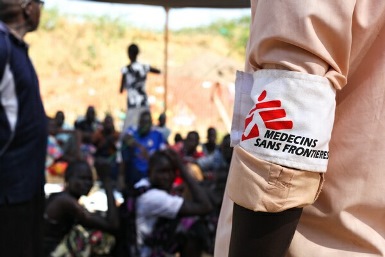Abyei communities still face challenges after violence: MSF
March 17, 2024 (ABYEI) – 20,000 internally displaced people continue to face major and long-term challenges two-years after the outbreak of violence in Agok, and fleeing of people to Twic and Abyei town, a medical charity said.
Agok is a town located on the border between Sudan and South Sudan.
Medicines San Frontiers (MSF) said substantial gaps remain in the delivery of humanitarian assistance and recent escalation of violence is a testament to this.
“After a massive wave of internally displaced people fleeing the conflict in Agok in 2022, the situation is quite stable today but so are the long-term challenges that have emerged”, says Nicolas Guiral, MSF Project Coordinator in Twic.
He added, “The main threat in 2024 is the important decrease in funding for South Sudan leading to a significant decrease in the presence and response of actors, with major concerns about lack of food, poor water and sanitation conditions – in the camps as well as in most host communities – and poor shelter conditions to cope with the coming rainy season, with limited access to quality healthcare services.”
Following violent clashes in early February 2022 in and around Agok, Abyei Special Administrative Area, an estimated 70,000 people were reportedly displaced, the majority fled to Abyei town, while others sought refuge in areas further south, with over 20,400 people registered in Twic County in Warrap State as of March 2022.
In a region that is already vulnerable and prone to recurrent disease outbreaks, the influx of displaced populations placed an additional burden on fragile communities, MSF said.
The situation reportedly worsened by heavy floods, remains tensed and volatile.
The area has recently experienced another wave of violence.
“In January 2024 alone, we’ve received more than 100 casualties, mainly gunshot-wounded patients in need of surgery, and we’ve been activating our mass casualty response plan multiple times”, explained Zélie Antier, MSF Project Coordinator in Abyei, adding that “As a consequence, we’ve upgraded our surgical capacity to be able to respond to the medical needs of the population.”
This renewed violence has led to deaths, serious injuries, destruction of property and livelihoods, and another displacement of populations. The consequences have stretched our teams and equipment and, in addition, during the clashes, MSF lost two staff members who, although off-duty and not targeted as MSF staff, became victims of the violence within the communities.
“In Twic the recent violence has mainly affected our activities by receiving civilian and soldiers wounded or killed”, explains Nicolas Guiral. “It’s also affecting an important part of our team since most of them have family (wife, relatives, etc.) who are from the other community and with the conflict some of them are separated up to now.”
MSF is reportedly providing Abyei and Twic MSF provides comprehensive care in four facilities and supports integrated community case management sites in the displaced camps. In the past year alone, our teams have supported 50,000 people and conducted 23,000 emergency consultations.
However, there is a huge lack of hospital care available in the area with, for example, no operating theatre in Twic County, the agency noted in a statement.
Cited as challenges are chronic issues, leading to chronic diseases, amid calls for action from relevant actors to address a seemingly worrying situation in the area.
According to the international medical charity, the magnitude of the crisis exceeds the capacity of any single entity, and a collaborative approach is essential for creating a more substantial and effective humanitarian response.
(ST)

